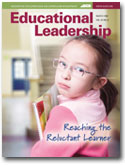March 1, 2008
•
5 min (est.)•
Vol. 65•
No. 6Ask About Accountability / Trolling for Tests
Question: Do you know of any summative tests that we can use to assess the effectiveness of instruction for map-reading skills across a middle school social studies curriculum? We are searching for a test that breaks down the questions into identifiable related skills. We have developed one test for the 6th grade level on our own. Finding a professionally developed test would be beneficial to us.
—Bill Jaeger, Tenafly School District, Tenafly, New Jersey
Answer: You've asked a great question, Bill. It's great because it raises the widely applicable question of how teachers can find out whether a test already exists that would satisfy their assessment needs.
For almost 70 years, the best place for educators to go to find out whether a particular sort of test already exists has been the Buros Institute of Mental Measurements. Now located at the University of Nebraska–Lincoln in the Buros Center for Testing, the Institute was the brainchild of Oscar Krisen Buros, who created The 1938 Mental Measurements Yearbook as a forum for leading scholars to publish "candidly critical" reviews of commercially available tests. The Seventeenth Mental Measurements Yearbook, which offers evaluations of the latest assessments in education, psychology, business, law, health care, counseling, and management, was published in 2007. From remarkably modest beginnings in the basement of Buros's rented New Jersey home, the periodically published Mental Measurements Yearbooks have had a powerful influence on the nature of educational measurement. The Buros Institute also publishes the Tests in Print series, a comprehensive bibliography containing key information about all commercially available English-language tests currently in print. The eighth edition of this bibliography is scheduled for publication in 2009.
Currently, because of the magic of the Internet, educators can access reviews of nearly 4,000 commercially available English-language tests on the Buros Center for Testing's Web site. Go towww.unl.edu/buros and click on the yellow box, Test Reviews Online. You can initiate your search for a suitable test using such categories as the name or the purpose of a test. By clicking on a given test, you can get information free of charge about such items as the test's purpose, authors, targeted population, and publisher.
If you think the identified tests are potentially appropriate, you can usually download two reviews of each test for $15. On the Institute's Test Reviews Online home page, you will find three sample reviews. If you happen to locate a whole herd of potentially suitable tests for your purpose, you can write directly to the test publishers for more information using the free-of-charge contact information available for all the listed tests.
I conducted a few trial searches of various topics using Test Reviews Online just to see what would come up. For example, when I entered "self-esteem" as a topic and requested a search by title and purpose, 15 assessments were identified, all of which had a 100 percent match with the two words (self and esteem) in my request. When I entered "interpreting graphs and tables" as a topic and requested a search by title, publisher, purpose, acronym, and scores, 34 tests were listed. However, eight of those matched with only two of the three terms in my request (a 67 percent match); the remaining 26 tests had only one word that matched (a 33 percent match). Clearly, a user of Test Reviews Online can frame a search request in various ways. For instance, when I searched for tests on the topic of "reading tables and graphs," I found an enormous caboodle of tests assessing kids' reading skills. My bad!
At the bottom of the Test Reviews Online page, you'll also find a link to the Educational Testing Service (ETS) Database. By clicking on the link, you'll be able to search an ETS library of more than 25,000 standardized tests and research instruments. However, some of those tests are rather dated. Many are assessment tools developed for research or less well-established tests without a formal test publisher. Most of the tests in the ETS collection have not been reviewed by the Buros Institute of Mental Measurements.
Back to your quest for a map-reading test for middle school students. Unfortunately, using both the Buros and the ETS sources, I struck out with three quick swings of my search bat. I suspect that to assess the skill you have in mind, you and your colleagues will need to develop the assessment from scratch.
You have conceptualized the task sensibly from an instructional perspective: You indicate you want a test that breaks down students' performances into identifiable skills. That's precisely the kind of diagnostic test capable of providing information to both teachers and students regarding what kinds of map-reading skills and knowledge students have already mastered or must still master. You clearly want your map skills test to be instructionally useful. Good for you!
